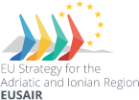8th Annual EUSAIR Forum
Sarajevo, Bosnia and Herzegovina | 23-25 May 2023Conclusions for the Pillar II Transport Sub-Group Session:
Planning for Sustainable Urban Mobility in the Adriatic-Ionian Region
The chair Jasminka Kirkova, EUSAIR Pillar 2 Coordinator, North Macedonia, opened the meeting and welcomed everyone, remembering the panelists that the time they had at their disposal was limited – every panelist needed to observe his scheduled time.
After that, the key-note speech was delivered by Mr. Pierluigi Coppola, EUSAIR Pillar 2 Coordinator, Italy. The keynote concentrated on the following points:
- Sustainable Urban Mobility is an increasingly important issue and needs to be tackled within the EUSAIR strategy.
- Urban mobility can be identified as how the local self-governments are managing the free flow of people and how to avoid congestion.
- Urbanization produces urban sprawl and an auto-oriented lifestyle as well as externalities such as pollution, congestion, reduced safety.
- However, there are new trends, some of which counteract the externalities of the urbanization such as the new lifestyle and digitalization, modal hubs (car and bike sharing), mobile services (the use of big data important,) electrification of cars and buses and urban air mobility.
- We need to rethink! Streets should not be vehicle but human oriented.
Mr. Coppola also reminded the audience that the TEN-T regulation is under revision and foresees that 424 cities in Europe (urban nodes) shall develop their Sustainable Urban Mobility Plans. More importantly, the EUSAIR Masterplan is under finalization. It will be an important strategy document for this part of Europe.
After this, the panellists started their contributions, which was describing different types of best practice of transport solutions throughout the regions of the EUSAIR Member States:
- Mr Jovica Rakic, Ministry of Construction, Transport and Infrastructure, Republic of Serbia. Sustainable urban mobility planning in Belgrade and Novi Sad
- Mr Michele Babuder & Dr Giulio Bernetti, Municipality of Trieste, Italy. Improving accessibility of segregated urban areas: the new cable-car project of Trieste
- Prof Yorgos Stephanedes, University of Patras, Greece. Sustainable tourism and mobility: case study of Lefkas (GR)
- Mr Aldo Paribelli, FSI BusItalia Veneto, Italy. Electrification of local public transit fleet in the city of Padua
A discussion was not emerging since the panellists were exhausting the complete time frame, therefore, there were no real conclusions to draw, other than:
- Urbanization and its externalities increasingly call for measures
- The EUSAIR action plan is under revision which includes urban mobility among the key focus areas for the Pillar 2
- Sustainable urban mobility is a topic of cross-pillar relevance for the Adriatic-Ionian Region, with significant potential synergies with the development of sustainable tourism, greener cities and ports
- The TEN-T regulation (currently under revision) foresees an increased role of urban nodes in shaping a greener core and comprehensive European interoperable transport networks
- The EUSAIR transport masterplan is under finalisation which will support the development of sustainable mobility in urban areas and accessing tourist destinations









